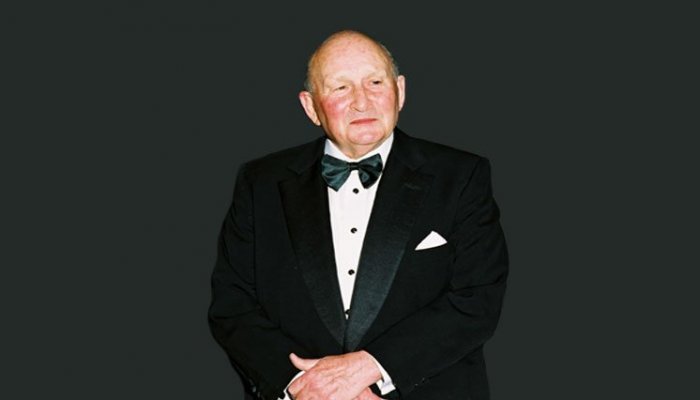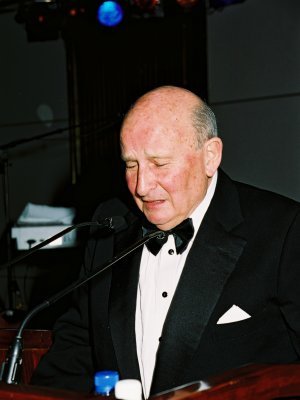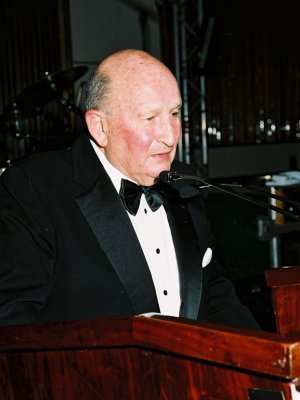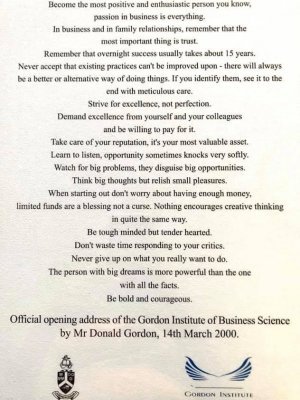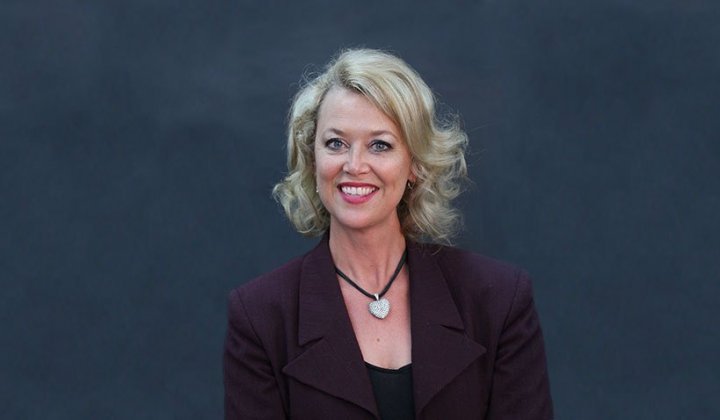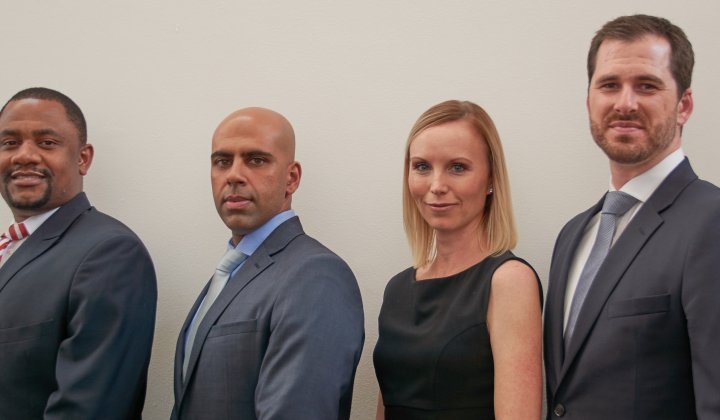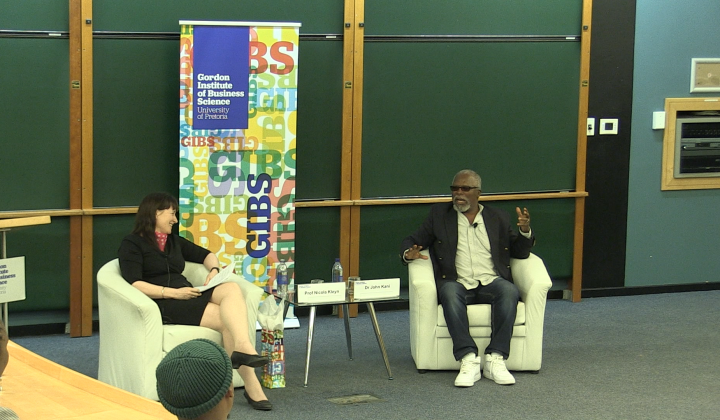Sir Donald Gordon was born on 24 June 1930 and died on 21 November 2019, aged 89. Named the Achiever of the Century in the financial sector by The Financial Mail and knighted in 2005 for his services to the arts and to business, Gordon is survived by his daughter, Wendy Appelbaum, and sons Richard and Graeme.
Born into an immigrant Jewish family, Gordon grew up in Johannesburg and attended King Edward VII School. Although Appelbaum says her father wanted to pursue science, he couldn’t afford to, and thus studied accounting part-time while working. He qualified in 1953, completing his articles at Kessel Feinstein. Just three years later he founded a life insurance company, Liberty Life. It went on to become one of South Africa’s greatest success stories.
Gordon later founded Liberty International in the UK, which has had enormous success in shopping centre developments. He pioneered shopping centre projects in South Africa, too, including one of the most iconic developments in the country – Sandton City.
Trail blazer
Gordon was disrupting the business world long before the term became popular. Liberty was the first company to introduce retirement annuity products to South Africa and the first to make unit trusts available in 1960.
“My father was really a grinder with huge energy for work,” says Appelbaum. “He loved work. He never saw it as a job. He had passion and patience – a formidable combination. He also always saw silver linings. He made advantage out of adversity. To him, there was an opportunity in everything.”
She says she learned honesty and integrity from him, as well as generosity. “He was an incredibly generous man who would give money away knowing he could make it back again. He never questioned himself – he had an incredibly good sense of self-esteem.”
He loved work. He never saw it as a job.
Nick Binedell, founding director and former dean of GIBS, says, “In terms of pure drive, energy and business acumen, Donald was one of South Africa’s greatest. Through my own involvement with two significant local institutions I came to know Sir Donald over the years. Firstly, as we looked to secure funding for what is now the Wits School of Governance, which opened its doors in the mid-1990s and was the first school of governance at an English-speaking university in this country. His foundation provided the capital to establish this institution. And, secondly, we were again brought together when starting the Gordon Institute of Business Science in 2000, a project to which he made a very generous contribution. Without his generosity and vision, it is highly unlikely that GIBS would ever have been established.”
The Donald Gordon Trust, created in 1971, funds projects that meet its objectives of encouraging excellence, protecting democracy and caring for community. GIBS is one of the foundation’s flagship projects. Another is The Wits Donald Gordon Medical Centre – the first and only private teaching hospital in Africa, established in 2002.
Gordon also remained personally committed to King Edward VII School, including donating Gordon House (one of the boarding houses at the school). Steve Jaspan, who was chairman of the King Edward VII School governing body in the early 1990s, recalls Gordon’s joy and pleasure in meeting the school’s first black head-boy, Wakule Tshabangu, in 2002, which he viewed as an important milestone in heralding transformation and merit.
In 2004, Gordon, who loved music, donated £10 million each to the Royal Opera House and Wales Millennium Centre. His reason for supporting the Wales Millennium Centre was his friendship with its founding patron and life president, Lord David Rowe-Beddoe.
The two men met in the 1970s. Rowe-Beddoe says his memories of Gordon include playing games of 91-piece dominoes – a complex version of the game invented by Gordon – and making music together. “I’m a pianist and he loved to sing, so whenever we got together, I would accompany him,” he says. “He enjoyed ballads. One of his favourites was ‘A little on the lonely side’.”
Rowe-Beddoe is a Welshman and recalls Gordon’s fascination with the Battle of Rorke’s Drift – specifically the bravery of the Welsh soldiers of the 24th Regiment. This prompted him to arrange a visit for Gordon to the Regimental Museum of The Royal Welsh in Brecon, including a dinner at which Gordon was able to hold some of the museum’s Victoria Crosses. “It appeared to be a very emotional experience for him,” he says. “He also enjoyed rugby, so I took him to see the Springboks play Wales in Cardiff. He was a very dear friend and I miss him greatly.”
Colin Datnow, chairman of the Chevrah Kadisha, one of the largest welfare organisations in South Africa, which has enjoyed a long relationship with The Donald Gordon Foundation, met Gordon and his family through their involvement with Sandringham Gardens, a welfare aged care centre for Jewish people.
“Sir Donald’s Foundation was responsible for the building of the magnificent Golden Acres, which comprises 144 units of unassisted living. Very importantly, the concept was to provide income for Sandringham Gardens, which could never really meet its budgets,” he says.
In the early 2000s, Sandringham Gardens was struggling financially and approached the Chevrah Kedisha for assistance. “In short, Sir Donald’s Foundation and Hylton, his son-in-law, who was intimately involved at the time, saved Sandringham Gardens by stepping in and making an extra special contribution in that year to balance up the budget. This has happened every year since, that the annual grant has continued and grown. Sandringham Gardens is truly indebted to The Donald Gordon Foundation, the late Sir Donald and Peggy, and of course Hylton and Wendy. The Donald Gordon Foundation has led the way and set the standard for giving to those in need.”
Without his generosity and vision, it is highly unlikely that GIBS would ever have been established.
A human leader
Despite Gordon’s wisdom and success, Appelbaum says she did have to conscientize her father about the importance and the abilities of women.
“He was a bit of a sexist. When he put me on his board for the first time at Liberty, all those years ago, we were in the first board meeting and he said, ‘Right any questions okay let’s continue.’ And I said, ‘Was that one sentence or two?’ He answered, ‘Two.’ And I said, ‘Well if that’s the case, I do have a question.’ After the meeting, he put his arm around me and said, ‘Darling, nobody questions me in my boardroom.’ I said, ‘Well, maybe that’s what used to happen, but as long as I’m here – and you’re welcome to kick me off – I am going to question you. That’s what a board is about.’ We adored each other. I don’t think anyone loved him as much as I loved him, but we could also box.”
Sitting around the dinner table was like being at business school...
She has inherited his fierce competitiveness and laughingly recalls how he stopped wanting to play tennis with her when he could no longer beat her (which would be tough, given that Appelbaum played at provincial level).
Binedell says Gordon was known to occasionally nod off in meetings – given that he only slept four or five hours per night. “He told me once that this allowed him to work at a rate few other people could. During one meeting I chaired I was convinced he had fallen asleep, so I made a point from the chair and gently tapped the table when I concluded. At that point his eyes opened and he said: ‘I agree with you, chairman.’ He then proceeded to repeat what I had said and offered to provide funding to support the idea.”
Nature of a visionary
What made Gordon so successful? GIBS Dean Nicola Kleyn has described his secret sauce as a "powerful constellation of remarkable acumen, rock solid values and formidable energy", while Jaspan says he was a visionary who had the courage of his convictions, and who was able to identify opportunities or areas of need.
Datnow believes there are several reasons for Gordon’s success. “Obviously a brilliant mind, an unbelievable flair for business, incredible commitment, passion, and of course, competitiveness beyond,” he says. “He had tremendous leadership abilities and could spot what could be great value and turn that into a great business. Added to all that was his remarkable benevolence and concern for people. He always wanted to help.”
Rowe-Beddoe says Gordon was quick and arithmetically inclined. “Everything was numerical to him and he could see the possibilities in the numbers.”
Appelbaum attributes her father’s success to his hard work, brilliant brain, drive, and self-assurance. “Sitting around the dinner table was like being at business school,” she says. “He would lecture – repeating himself until things became crystal clear in his mind. Everything was a puzzle to him. It was interesting how his brain worked. Even as children, if we had to fetch socks out of a drawer, he would ask how many we’d have to take out to be assured of having a pair. Things like that. He was just very clever.”
Donald Gordon’s principles for business success
At the official opening address of GIBS on 14 March 2000, these were the principles Gordon shared – those he lived by throughout his own career:
· Become the most positive and enthusiastic person you know. Passion in business is everything.
· In business and in family relationships, remember that the most important thing is trust.
· Remember that overnight success usually takes about 15 years.
· Never accept that existing practices can't be improved upon – there will always be a better or alternative way of doing things. If you identify them, see it to the end with meticulous care.
· Strive for excellence, not perfection.
· Demand excellence from yourself and your colleagues and be willing to pay for it.
· Take care of your reputation – it's your most valuable asset.
· Learn to listen – opportunity sometimes knocks very softly.
· Watch for big problems – they disguise big opportunities.
· Think big thoughts but relish small pleasures.
· When starting out don't worry about having enough money – limited funds are a blessing not a curse. Nothing encourages creative thinking in quite the same way.
· Be tough-minded but tender-hearted.
· Don't waste time responding to your critics.
· Never give up on what you really want to do.
· The person with big dreams is more powerful than the one with all the facts.
· Be bold and courageous.


